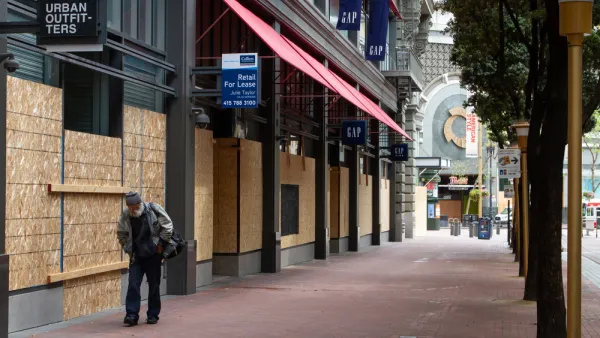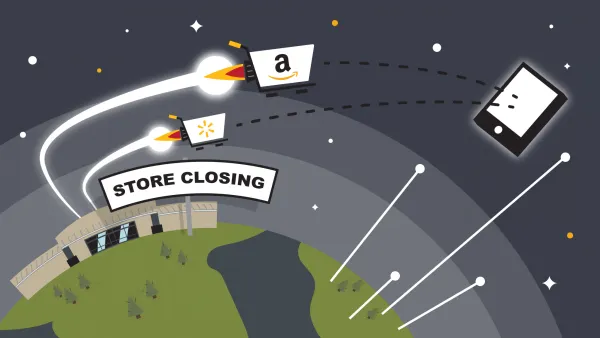While some cling to debatable claims about higher crime rates as the cause for recent high-profile store closures in U.S. downtowns, the real reasons are more realistically extensions of the causes of the “retail apocalypse” from the before times.

Major retailers like Nordstrom, Whole Foods, CVS, Starbucks, and Walmart have been announcing store closures in U.S. downtowns in recent weeks and months, contributing to the ongoing narrative about the “urban doom spiral” afflicting many U.S. cities as living patterns shift as a result of the Covid-19 pandemic.
According to an article by Nathaniel Meyersohn for CNN, “Several forces are pushing chains out of some city centers: a glut of stores, people working from home, online shopping, exorbitant rents, crime and public safety concerns, and difficulty hiring workers.”
The solution, according to the article, is more residents, in denser neighborhoods, argues Meyersohn, “with a broader mix of affordable housing, experiential retail, restaurants, entertainment, parks and other amenities.”
The article also argues that from the list above, the effect of crime has likely been overstated in the media, while a glut of stores has been understated. “Walgreens said it saw a spike in losses, known as shrink, during the pandemic and cited organized retail crime in its decision to close five San Francisco stores in 2021. But it recently backtracked,” writes Meyersohn.
Also noteworthy, according to the article, is the duration of the recent history of store closures—it predates the onset of the pandemic by several years, in fact. “San Francisco, Los Angeles, San Diego, New York City, Seattle, Miami and Chicago lost retail stores from the beginning of 2017 to the end of 2021, according to research from the JPMorgan Chase Institute, a think tank.”
One with a memory of the before times might recall the “retail apocalypse” that garnered so much attention. “According to Morgan Stanley, from 1995 to 2021, more stores closed every year than opened,” Meyersohn reminds us.
More nuance and data is available at the link below.
FULL STORY: The real reasons stores such as Walmart and Starbucks are closing in big cities

Analysis: Cybertruck Fatality Rate Far Exceeds That of Ford Pinto
The Tesla Cybertruck was recalled seven times last year.

National Parks Layoffs Will Cause Communities to Lose Billions
Thousands of essential park workers were laid off this week, just before the busy spring break season.

Retro-silient?: America’s First “Eco-burb,” The Woodlands Turns 50
A master-planned community north of Houston offers lessons on green infrastructure and resilient design, but falls short of its founder’s lofty affordability and walkability goals.

Test News Post 1
This is a summary

Analysis: Cybertruck Fatality Rate Far Exceeds That of Ford Pinto
The Tesla Cybertruck was recalled seven times last year.

Test News Headline 46
Test for the image on the front page.
Urban Design for Planners 1: Software Tools
This six-course series explores essential urban design concepts using open source software and equips planners with the tools they need to participate fully in the urban design process.
Planning for Universal Design
Learn the tools for implementing Universal Design in planning regulations.
EMC Planning Group, Inc.
Planetizen
Planetizen
Mpact (formerly Rail~Volution)
Great Falls Development Authority, Inc.
HUDs Office of Policy Development and Research
NYU Wagner Graduate School of Public Service




























